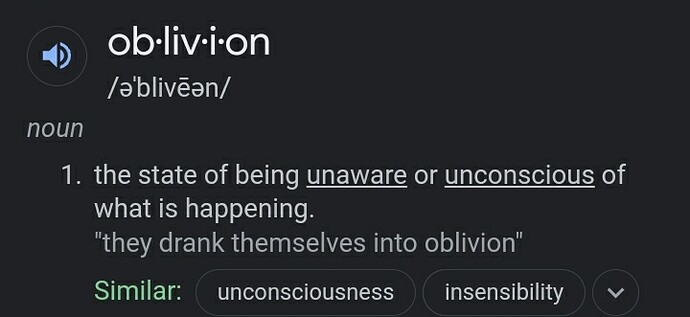Precisely the stubborn image I have always held to some degree. Could be a common human intuition. The Christian ideas of heaven and hell which I inherited when very young were useful to me as an effective analgesic for the discomfort arising from that frightening and intuitive image of death you describe. An effective coping mechanism, in other words. Those beliefs served their purpose until incredulity dampered their potency, and other means for coping were explored or relied upon.
Indeed, even the idea of oblivion – of zero experience whatsoever – which, fortunately, is based on much stronger foundations of evidence and therfore less susceptible to incredulity, serves these days as a potent relief to the persistent intuition of that instinctively-derived eternal hell.
I’m convinced it’s a uniquely human conceptual expression of that instinctual aversion to death, which is evidently common to all mammals, if not all vertebrates. The fact of death, and our observations of what it is to no longer be animated, along with the painful aversion that is experienced, seems to get abstracted or conceptualized in our minds, crystalizing into representations and images such as the one you described.
The hedonic pain I have personally experienced of being trapped alone in a dark cramped place (I’m a claustrophobe) gets abstracted and linked to my instinctual aversion to death. It becomes the image that death represents for me. (Are you especially claustrophobic by any chance?)
this [image of being in this dark abyss, separated from everyone and everything for eternity with no way out] is what death apparently entails, that is the suffering I am trying to escape, through the misguided attempt at escaping death! What I am seeing now though is like a reversal of facts, because that place that ‘I’ am so afraid to go to after physical death is actually what ‘I’ am deep down as a ‘being’ already. It is the prospect of existing forever as an identity that is the original cause of suffering and not death!
Brilliant. Somehow we expect to exist … after we cease to exist. It’s nonsensical. When we say that we fear the end of our existence (at least when I say it), it’s actually the fear of the end of an existence that we’re comfortable with, and the commencement of an everlasting existence that we are definitely not comfortable with. True non-existence does not fully enter into our heads. If it did, we’d have absolutely nothing to fear.
Perhaps it would be better to say true non-experience does not enter fully into our heads. (I’ve made a big deal in other posts about how non-existence per se doesn’t exist  . ) So, more accurately, it’s the non-existence of experience that eventuates. The existence of a breathing animated body now terminated, now existing as a non-breathing inanimate body. In time, even the non-breathing inanimate body ceases to exist (decomposition), and its constituent bits and pieces get absorbed into the activities and happenings of nearby objects and arrangements. “Pushing up daisies,” and so forth.
. ) So, more accurately, it’s the non-existence of experience that eventuates. The existence of a breathing animated body now terminated, now existing as a non-breathing inanimate body. In time, even the non-breathing inanimate body ceases to exist (decomposition), and its constituent bits and pieces get absorbed into the activities and happenings of nearby objects and arrangements. “Pushing up daisies,” and so forth.
![]()
